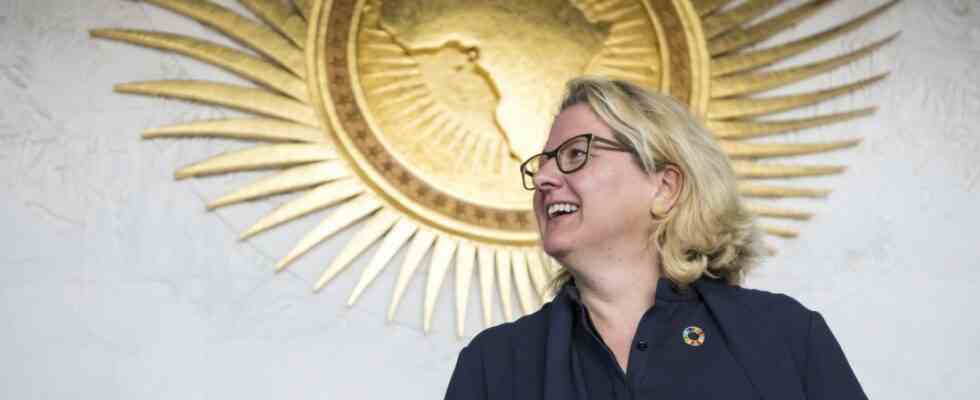Svenja Schulze has a sunny disposition, which doesn’t change when she talks about less sunny topics. The Development Minister (SPD) is in her ministry late Tuesday morning and is demonstratively in a good mood. She invited to present the federal government’s new “Africa strategy”. It’s a complicated relationship between Europe and Africa, for many reasons. The minister addresses one thing straight away: the phase at the beginning of the pandemic, when the first vaccines were developed. “What did the rich countries think of first?” asks Schulze, and immediately adds the answer: “Of course, about themselves.” Vaccine doses were hoarded instead of being distributed worldwide – it was clear that that would have made much more sense in order to push back the corona virus in the long term.
Schulze says you can’t promise that it will be different in the next pandemic – but you want to do everything you can to ensure that Africa can produce its own vaccine in such a case. “That’s the respectful interaction we need with each other.” Standing next to her is Ahunna Eziakonwa, the regional director for Africa at the United Nations Development Program (UNDP). She says she finds the traffic light coalition’s plans “inspiring” — and adds elegantly poisoned praise: You can see that Germany, as part of Europe, has “made a development” in its attitude towards Africa.
The future relationship, everyone agrees, should be characterized by “respect” and the aim is a relationship on an equal footing. Schulze says that Germany’s engagement in Africa is by no means about charity. “It doesn’t matter that there’s a German flag somewhere.” On the contrary. You have economic interests, that’s no secret.
Wind and sun in Africa should also cover Germany’s energy needs
In fact, Africa is economically interesting for many reasons: Schulze mentions natural resources, wind, sun – all of this should help to better cover Germany’s energy needs in the future. There is also agricultural “potential”, as Schulze puts it. Above all, Africa is a young continent, unlike Europe. Europe hopes to attract some of these many young people as well-trained specialists, after all it is very difficult to fill vacancies here. But of course jobs would also have to be created on the continent itself, a great many jobs: 25 million new jobs would be needed every year, says Schulze. That is an enormous number, even for such a large continent. There, too, one wants to help, and entrepreneurship should be supported.
Overall, German efforts should focus on building a climate-friendly economy, agriculture independent of foreign seeds, but also the establishment of better social and health systems – also to prevent mass migration, new pandemics and high CO₂ emissions. The alliance for global food security is also intended to respond to hunger crises more quickly and in a more coordinated manner.
In all areas there is a focus on the situation of women: by 2025, the Development Ministry wants to increase the proportion of funds that “directly or indirectly contribute to gender equality” from the current 64 to 93 percent. This includes the promotion of women entrepreneurs as well as better access to contraceptives.
The continent is “greatly hungry for democratic structures”
However, it is not only Europe that is interested in Africa’s economic potential; China and Russia are also trying to expand their influence on the continent. UNDP Director Ahunna Eziakonwa is asked what makes Europe more interesting as a partner than China, for example. Different regions have different strengths as partners, says Eziakonwa. You will also not be able to pinpoint a contact person. But there is “a great hunger for democratic structures” in Africa, she says.
In any case, the reactions to the Africa strategy were mixed among non-governmental organizations (NGOs). The direction of the development organization One is good, especially the feminist orientation is a positive new aspect in German development policy. However, the objectives and funding are not specific enough. In addition, Schulze’s ministry cannot alone determine the success of the German strategy; the economics, foreign and defense ministries must also do their part. Otherwise there is a risk of “conflicts of interest”.
The church aid organizations Misereor and Bread for the World complained that there were no concrete ideas for the fight against hunger. Criticism also came from the opposition: Volkmar Klein, the development policy spokesman for the Union faction in the Bundestag, saw “mainly catchphrases”, Cornelia Möhring from the left made a similar statement: “Ultimately, as is so often the case, what exactly should be done remains in the fog.”

